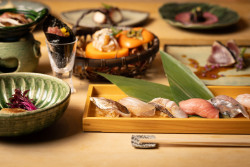
July 7, 2011
Turtle Island
The roots-punk collective heads up Radical Music Network’s 10th anniversary
Originally published on metropolis.co.jp on July 2011

Famed singer Yoshiki represents Japanese rock worldwide as leader of visual-kei band X, but another Japanese front man named Yoshiki epitomizes an entirely different strain of Japanese rock.
The latter Yoshiki is the leader of Turtle Island, a 14-strong collective based in Japan’s Motor City of Toyota. In contrast to X’s histrionic take on Japanese kayoukyoku ballad-rock, Turtle Island set Japanese roots minyo music and taiko drumming to an aggressive base of in-your-face punk.
Along with Japanese punk veterans Brahman, traditional chindon street music-influenced outfit Asakusa Jinta, Fuji Rock visitors Obrint Pas from Spain, and Mate Power from Germany—as well as a special guest rumored to be Spanish firebrand Manu Chau—Turtle Island will be heading up Radical Music Network’s 10th anniversary event.
Created a decade ago when Japanese-Argentine Shogo Komiyama perceived an interest in Latin culture on seeing young Japanese in Che Guevara t-shirts, Radical Music Network has introduced Japanese audiences to what Komiyama calls “rock Latino rebel music.” Each year, Komiyama selects bands to play the Fuji Rock Festival, and for this reason Radical Music Network always takes place on the Wednesday before the festival, serving as a kind of warm-up party.
“Shogo and I are soul mates,” Turtle Island’s Yoshiki explains by phone from Toyoda. “We are moving in the same direction and trying to accomplish similar things. Not just the music, but Shogo’s DIY approach is something I can relate to because that’s how we run Turtle Island.”
Founded in 1999 out of the remains of punk band Nice View, Turtle Island call themselves a “tribal hardcore punk orchestra.” On albums such as last year’s soundtrack for the film Punk Kabuki Macbeth, their sound combines overdriven rock guitars with oriental melodies, taiko drums, and Yoshiki’s formidable, lung-busting shriek set against female singer Takemai’s melodic intonations.
The band takes its name from Yoshiki’s interest in native cultures. “In my 20s I was fascinated by indigenous peoples,” he explains. “In Native American language ‘Turtle Island’ stands for the world, and there are other traditions where turtles represent the universe. Also, turtles are slow, and I’m big on the slow life!”
Yoshiki’s compositions take up themes of ethnic identity and globalization. His recent song “A Hope,” for example, is a play on the word “hope” and the Japanese word “aho,” which translates roughly to “idiot.”
“The song says globalism is a lie, and that we should not all be the same, but different and unique each in our own way,” says Yoshiki, who also runs a live house in Toyota. “It opposes attempts to idiotically lump different nationalities and ethnicities together, but also expresses hope that we can live together as one while respecting each other’s differences.”
Still, Turtle Island avoid overt political statements. “Music is music, and politics is politics,” Yoshiki believes. “For example, I’m against nuclear power, but I think it’s something that should be said in words, not in song. Music should take on universal themes, themes of the heart. Politics should be dealt with in speech and action. For Turtle Island, music is irrational. Music should be felt in your cells, in your soul, not understood in your brain.”
Numerous attempts have been made to merge Western rock with Asian musical traditions, many of them never rising above the level of schlock. “The difficult part of blending Western music with traditional Japanese music is that they really are fundamentally different,” Yoshiki admits. “For example, Western rhythms hit directly on the beat, while Asian rhythms fall behind the beat. Asian music is more rhythmically relaxed, so it’s hard to bring the two rhythmic senses together. But we don’t worry about it too much—we just have fun.”
For those with the stamina for a midweek all-nighter, Radical Music Network should offer plenty of fun and then some. More than a party, it also constitutes a small landmark in the history of Latin rock in Japan.
“In 1999 we did our first Fuji Rock Festival with an Argentine band called Todos Tus Muertos,” explains Radical Music Network’s Komiyama. “I saw Japanese people go crazy to them, and I said to myself, Latin rock bands can rock a Japanese audience—that was the beginning of the story.
“In Argentina rebel music is a common thing, especially for people of my generation who grew up during the military dictatorship,” Komiyama continues. “We’ve been doing Radical Music Network for ten years and now the scene is quite big in Japan. We are very proud of what we are doing and we will keep transmitting a rebel attitude and message to Japanese youth through this kind of event.”
Shimokitazawa Garden, July 27. See concert listings (popular) for details.







